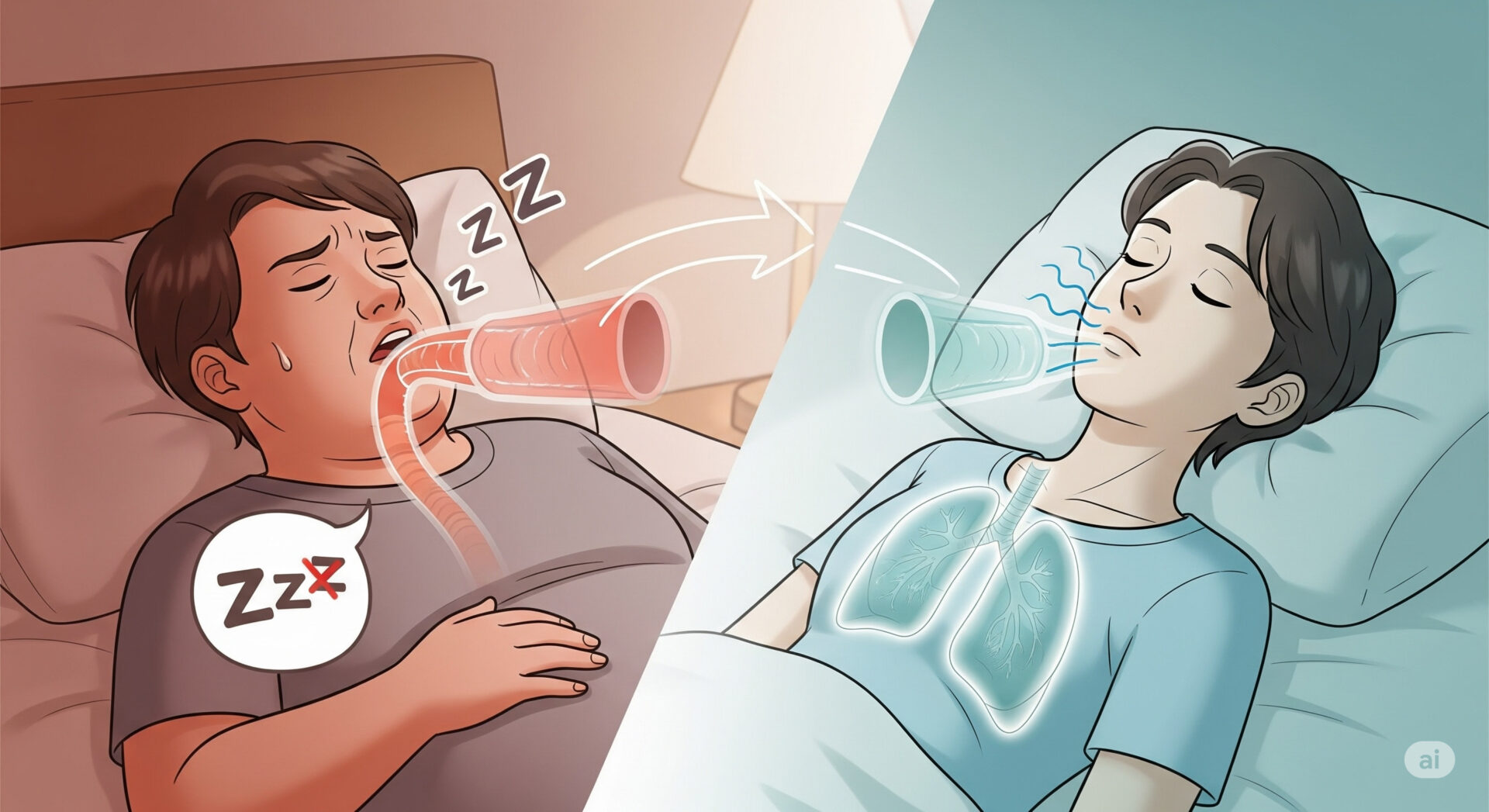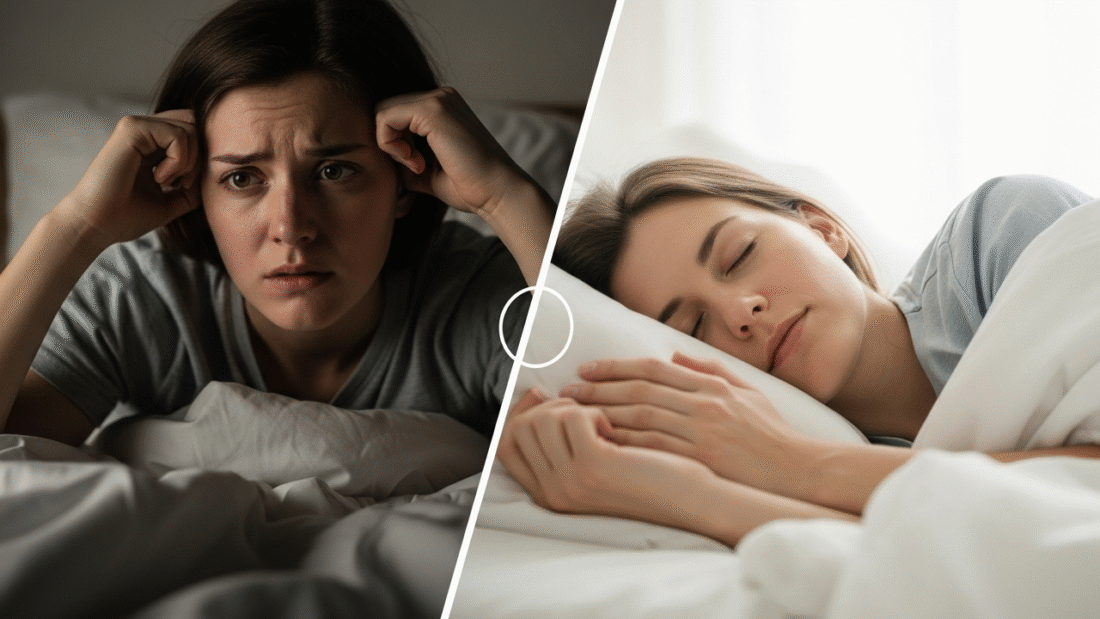The Heavy Truth: How Weight Affects Your Breathing
Let me tell you about my patient Mark. At 280 pounds, his sleep apnea was so bad that his oxygen levels dropped dangerously low every night. After losing just 30 pounds? His CPAP pressure needs have decreased by 30%. At 50 pounds down? He started having nights with zero apnea events.
This isn’t magic – it’s anatomy. Excess weight, especially around the neck:
- Squeezes your airway like a stepped-on garden hose
- Increases inflammation, which worsens breathing
- Disrupts hormones that regulate sleep
The American Sleep Association confirms That Losing weight helps approximately 80% of overweight apnea patients, but the extent of the help depends on seven key factors.
Secret #1: Why Just 10% Weight Loss Makes a Huge Difference
You don’t need to become a fitness model to see improvements. Research shows:
10% weight loss = 26% reduction in apnea events (AHI score). 15% loss = 50%+ improvement for many mild cases. 20% loss = Complete remission is possible for some
Why it works: Even modest weight loss reduces fat deposits around the pharynx that collapse during sleep. My client Sarah dropped from 200 to 180 pounds and cut her apnea events in half – no more morning headaches!
Secret #2: The Neck Fat Connection You Can’t Ignore
Measure your neck circumference right now:
- Men >17 inches = High sleep apnea risk
- Women >16 inches = Same danger zone
Every 1-inch reduction in neck size can improve breathing by up to 30%. The best exercises?
✅ Chin tucks (5 sets of 10 daily)
✅ Resistance band neck stretches
✅ Swimming (natural resistance training)
Pro Tip: Combine these with Sumatra Slim Belly Tonic to target stubborn neck fat. Many users report better breathing within weeks. See how it works
Secret #3: How Inflammation Worsens Apnea (And What Helps)
Fat cells pump out inflammatory chemicals
- Swell throat tissues
- Weaken airway muscles
- Disrupt breathing signals
The Fix:
- Anti-inflammatory diet (berries, fatty fish, leafy greens)
- Turmeric or ginger tea before bed
- Deep breathing exercises to strengthen airways

Secret #4: The CPAP Weight Loss Bonus Nobody Talks About
Here’s an amazing cycle:
- CPAP gives you better sleep
- Better sleep regulates hunger hormones
- Easier weight loss occurs
- Weight loss reduces CPAP needs
Case Study: James needed a CPAP pressure of 12 initially. After losing 40 pounds? Down to 8 – and sleeping more comfortably than ever.
Secret #5: When Weight Loss Alone Doesn’t Cut It
I wish I could tell you weight loss fixes every case of sleep apnea, but that wouldn’t be honest. In my practice, about 1 in 5 patients still struggle after significant weight loss because of:
Physical Factors:
- A deviated septum (that crooked nose bridge you’ve had since childhood)
- Oversized tonsils (yes, even as an adult)
- Naturally narrow airways (thanks, genetics)
Age-Related Changes:
- Throat muscles are losing tone (like everything else as we get older)
What Actually Works When Diet Isn’t Enough:
- Custom dental devices (think: fancy night guards that reposition your jaw)
- The Inspire implant (a tiny pacemaker for your tongue – wild technology)
- UPPP surgery (sounds scary, but can be life-changing for the right candidates)
The key? Get a proper sleep study before and after weight loss to see what you’re really dealing with.
Secret #6: The Game-Changing Sleep Position Hack
Here’s a freebie that works shockingly well: sleeping on your side instead of your back. It’s not just an old wives’ tale – studies show it can:
- Cut apnea events in half
- Prevent that awful tongue collapse feeling
- Boost oxygen levels naturally
Try These Tonight:
- The tennis ball trick (sew one into the back of your pajama top)
- A wedge pillow to keep you tilted
- Specialized position trainers like the NightShift device
One of my patients, a truck driver named Dave, reduced his CPAP pressure needs by 40% just by switching to side sleeping. Sometimes the simplest solutions work best.
Can Weight Loss Cause Hair Loss? 5 Essential Truths You Need to Know
Secret #7: Keeping the Weight Off for Long-Term Relief
The hard truth? Most people regain weight within 2 years, and with it comes back the snoring, the gasping, and the exhaustion. Here’s how to break the cycle:
- Weekly weigh-ins (like a meeting with your future well-rested self)
- Protein at every meal (keeps you full and maintains muscle)
- Accountability partners (join a sleep apnea support group)
- Natural metabolic support (products like Sumatra Slim Belly Tonic can help maintain results)
Real People Results: Weight Loss Success Stories
Maria’s Story: “After losing 38 pounds, my sleep study showed 80% fewer apnea events. I went from 25 episodes/hour to just 5!”
Tom’s Breakthrough: “Combining 15% weight loss with positional therapy let me ditch my CPAP completely after 5 years.”
Your Burning Sleep Apnea Questions
Q: Can I really cure my sleep apnea by losing weight? A: If yours is mild and weight-related, there’s a good chance. More severe cases usually see improvement but may still need some treatment. The only way to know? Try it and get retested.
Q: How soon might I notice changes? A: Most people start feeling better within 2-3 months of consistent weight loss. The snoring usually improves first – ask your partner!
Q: What’s the single best exercise for apnea? A: Swimming wins gold. The horizontal position is perfect, and the breath control strengthens exactly the muscles you need.
Q: Will going keto help my apnea? A: Many of my patients report improvement, likely from reduced inflammation. But check with your doc first – it’s not for everyone.
Q: Do supplements like Sumatra Slim Belly Tonic actually make a difference? A: The right formula can help with both weight management and reducing inflammation, two key factors for apnea relief. See real user experiences here
The Bottom Line on Weight Loss and Sleep Apnea
Here’s the straight talk: dropping pounds is the closest thing we have to a natural “cure” for weight-related sleep apnea. Will it work for everyone? No. But even if you still need some treatment, losing weight will make it work better and feel easier.
Your Next Step: Commit to losing just 5% of your body weight. Track your sleep quality. See what changes. Your future self-well-rested, energized, and healthier, is waiting.
If your sleep apnea is linked to excess weight—especially around the belly—then losing that fat could be a game-changer for your breathing. That’s where Sumatra Slim Belly Tonic might help. This natural formula is crafted to target stubborn belly fat, support metabolism, and gently assist in weight loss, which can ease pressure on your airway and help reduce sleep apnea episodes. It’s not a cure, but for many, it’s been a helpful step toward better sleep and easier breathing. 😴
Sumatra Slim Belly Tonic – Natural Sleep Aid for Healthy Weight Loss
Been through this journey? Share your wins and challenges below to help others! 👇



Leave A Comment